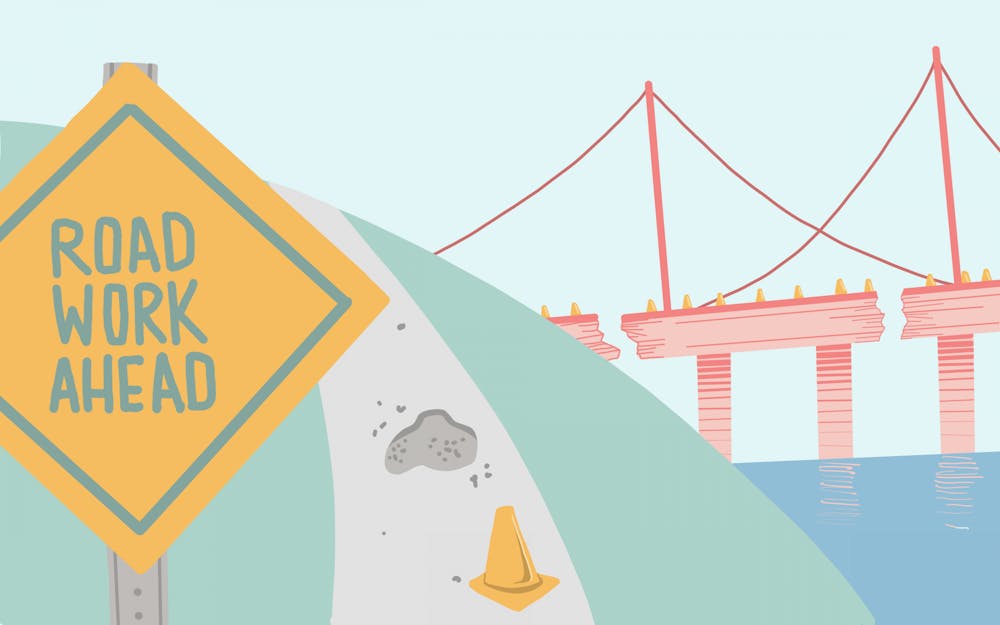As an IU student, I can understand just how crucial it is for the U.S. to have a good infrastructure.
We need good electricity for the internet, submitting assignments through canvas and having power for our apartments and homes. If our power grid was to ever fail, we wouldn’t be able to proceed in our day-to-day lives as students.
We rely on the rail system as well. Around half of all rail shipments are food products and energy products. If our rail system was to collapse, large shipments of food and electrical products wouldn’t be accessible to many areas – including us.
[Related: OPINION: Denouncing the horrors of capitalism]
But the U.S. is supposed to offer an efficient power grid and a strong rail system. We are supposed to be the world’s leading superpower. We have the most advanced military and the highest GDP.
Why is it, however, that with all our advancements, luxuries and all our government’s wealth, our infrastructure is failing? Why is it that our power grid and railroad systems are falling apart? Why did the trains in East Palestine derail and why did Texas have a severe power outage in 2021 that took the lives of 246 people?
Is it because of pure chance and bad luck, tragic accidents that couldn’t be avoided?
No. These incidents reveal a looming problem to the American people. They reveal that the electrical grid is outdated and that the rail system is being neglected.
Instead of prioritizing the American people and tackling these issues, the U.S. is more focused on the war industry. Our government currently has a defense budget of $738.2 billion dollars. Railroads only have a budget of $28.16 billion, and the department of energy has requested a budget of $48.2 billion this year.
Our government’s eyes are too focused on the rest of the world, rather than addressing our country’s infrastructural problems that are piling up.
Instead of manufacturing more fighter jets, there should be more spending toward improving our power stations. Maybe we shouldn’t be throwing more money at nukes, but rather at better safety regulations for rails and better conditions for railroad workers.
But to truly address these issues, we need to analyze these systems and how they are failing. That’s the first step in solving our crisis.
The electrical grid in the U.S. is divided into three separate regions: The Eastern Interconnection, The Western Interconnection and the Texas Interconnected System. These three regions contain 22 subregions.
As power grids age, they become more vulnerable to severe weather events. Within all these regions and grids, over 70% are over 25 years old. These grids were built with an assumption of a steady climate.
The tragedy in Texas could have been prevented if their grid was more up to date, being modernized to withstand the cold and having better access to natural gas. Regulations were written to help solve the issue, but electric companies were allowed wiggle room when it came to weatherization updates to help save money.
As a result, the power stations put out little energy due to the frigid temperatures. This lack of energy started electrical blackouts and then caused the production of natural gas to lower as the two are interconnected.
This isn’t an issue only for Texas, but for the whole power grid. As the climate continues to change and more severe weather events occur, most of the U.S. power grid won’t be able to withstand the change.
And then we have the railroad system. The U.S railroad system isn’t outdated like the electrical grid, but a lack of good working conditions and regulations causes severe issues.
The railroad industry is set at nearly $80 billion dollars. It’s one of the largest industries in the country, responsible for 167,000 jobs and over 140,000 miles of rail. Despite these massive numbers, thousands of workers went on strike earlier this year.
[Related: OPINION: The western press should stop lying about North Korea]
Instead of paying more, rail companies cut their workforces by 30%. Instead of making more safety regulations, rail companies lobbied for the weakening of these rules. In 2021 alone, there were 2,145 train accidents.
The U.S. government continues to allow the electric and rail companies to neglect their systems, prioritizing profits over modernizations and safety. This affects the entire country. If this trend continues, more power outages can happen, and more severe train accidents can occur.
Our infrastructure is crumbling, and the lives of every American citizen can be impacted by this blatant neglect.
Despite this, our government continues to worry about threats that are thousands of miles away, rather than the cracks weakening the foundation we live on.
Nick Moser (he/him) is a senior majoring in English and minoring in political science and film production.






